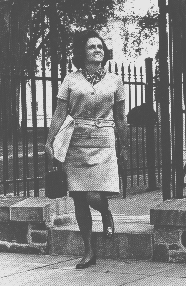Page 28
[Begin Tape 1, Side A]
Ritchie: I think both of us agree that today we'll start out by following up on a few things from last time.
Shelton: Why don't you go first?
Ritchie: Most of my questions have to do with your time at the Chicago Sun. How did you learn the ropes of being a cub reporter? How did you learn what to do or where to go?
Shelton: I suppose you'd say by trial and error. I remember one of the first things they ever sent me out on was to cover some silly women's meeting out somewhere I didn't know how to get to but I finally did. It was in a church basement. I think it was a League of Women Voters meeting, they said. Well, I couldn't find it. I found the church but there was no meeting. So I called up in a great panic. I'd failed my first assignment. And they said, "Well, that's all right. Come on back in the office." I've since thought that they—I've read in other cases that city desks do that, they make up assignments to see how well you cope, so I'm not sure there really was one. That's all I can say. It was kind of by trial and error. I don't know.
Ritchie: Was there anyone in the office in particular who took you under their wing?
Shelton: Yes, sort of, the managing editor, Pete Akers—I mentioned him last time. Of course, I was fascinated by him because he was a political editor, as well as the managing editor by then, but his whole background was politics and I was fascinated by politics. And he was kind of amused at me. He used to say, because I was the liberal running out—the bleeding-heart liberal, he used to call us, worried about every sparrow that fell. And he used to say sort of tolerantly, "Well, if you're"—how does the phrase go? Anyway, the idea is that you ought to be liberal until you get to be about forty.
I remember once when I was on the political trip—I think I may have told you that last time—I was covering a woman running for Congress, Emily Taft Douglas, who only had one little speech. She kept varying the way she said it but I only had one little speech to go on. So I tried to make it sound different every day but I really only had about two paragraphs of the gist of her speech. Finally, I just had nothing new that I could make out of the same paragraph so I said, "Emily Taft Douglas tonight reiterated"—and I got this stern telegram from Pete saying, "You never say somebody reiterated. Make it sound new, anyway."
But I would get little things like that. I remember him calling in another time when I guess I was showing off. I used a big word. I talked about the cacophony of sound. Something I was covering was very noisy. And he said, "Well, never use a big word when a little one will do." So little things like that.
We didn't have what papers that I know best, the Washington Star where I worked so long, they had a training program where they would take bright boys and girls who had been copy boys and girls and train them for three months. Usually an assistant city editor would be kind of in charge and would go over their copy painstakingly and say now this is, you should have done this this way. That would have been great but we didn't have anything like that. The paper was suffering badly from the fact that a great many of their trained male reporters had gone off to war so it was a sink-or-swim situation. They didn't even have very many trained editors capable of doing a good job. So it really was like being thrown in the water to swim.
Ritchie: Did you socialize much with other people on the paper, after work?

